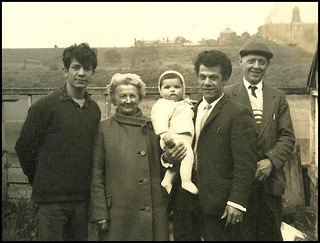
As I cycled along a city ring road once, my saddle was grasped from behind. A youth on a bike with cow horn handlebars scraped his shoe along the tarmac as he dragged us both to a standstill. He simply stared at me.
“What do… you want?” I said. He didn’t offer a word. His fist then slammed into my nose. He yanked back on his cow horns and wheelied off.
In the wake of the Black Lives Matter protests following the death of George Floyd, many previously silent people have given voice to their own experiences of racism. Like other mixed-race children growing up in England, I too felt a measure of it.
Another time, when I found a school door was locked, I tapped on the glass at a passer-by to let me in. He opened the door, showered me with a face full of spittle, locked it again and walked off. Sometimes, motives for actions were not stated; on other occasions, however, they were verbalised with venom.
I was aware then, though, that many English children were mistreated, often worse than me, for being different in some other way. Though my own experiences hurt, they were far outweighed by the friendship, help and affirmation I received from others in England as I grew up. Everyone needs to learn to forgive those who sin against them, as our own thoughts, words and deeds against others are forgiven.
When as an adult I moved to live and work with the church in Albania, I experienced racism from another angle: how
some Greeks view those from their neighbouring country. When one Greek filling-station attendant eyed my Albanian car registration plate, I was actually refused petrol. I am stopped and questioned constantly by the Greek police on motorways, at road-toll stations and in supermarket car parks. Then, a cheerful ‘good morning’ and an offering of my British passport noticeably changes their attitude and my treatment.
This brings its own particular feeling of mistreatment: of being mistaken for something you know you are not. It perhaps gets to the crux of the matter: being seen as inferior, less human, potentially criminal even, on the basis of a wrong assumption. It has certainly made me more sympathetic to Albanians.
Many of these incidents of ‘mistaken racism’ were reworked into a novel I wrote called ‘The Migrant’. It tells the story of an Albanian youth who sets off to Greece in search of work and a better life, and three friends who set off to Athens to find him. There they encounter police brutality and casual racism on the roads, as well as populist rallies and organised attacks by a resurgent far right group.
On their way home, as the characters lament such struggles, they talk of a time and place where people of every race and nation will be welcomed and equally valued: where there will be no more crying and pain. Until then, there is longsuffering for so many, but it is eased with a sweet and certain hope that this place is prepared for us - and that we
will get there.
 'Racism... that's illogical captain!'
'Racism... that's illogical captain!' Paul Alkazraji's novel ‘The Migrant’ is published by Instant Apostle.
Find copies of ‘The Migrant’ here:
https://www.amazon.co.uk/gp/product/B...

 newest »
newest »
 newest »
newest »
 A very positive response to unfair treatment and unwarranted acts of hate. And you are right. One day it will all be made right. And that is where we can experience hope.
A very positive response to unfair treatment and unwarranted acts of hate. And you are right. One day it will all be made right. And that is where we can experience hope.







